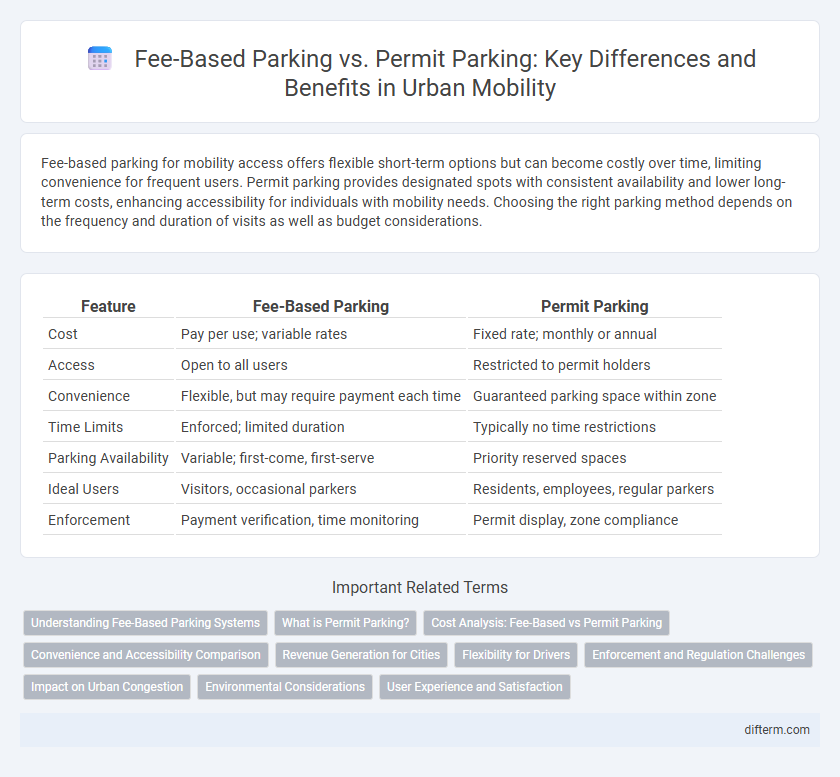Fee-based parking for mobility access offers flexible short-term options but can become costly over time, limiting convenience for frequent users. Permit parking provides designated spots with consistent availability and lower long-term costs, enhancing accessibility for individuals with mobility needs. Choosing the right parking method depends on the frequency and duration of visits as well as budget considerations.
Table of Comparison
| Feature | Fee-Based Parking | Permit Parking |
|---|---|---|
| Cost | Pay per use; variable rates | Fixed rate; monthly or annual |
| Access | Open to all users | Restricted to permit holders |
| Convenience | Flexible, but may require payment each time | Guaranteed parking space within zone |
| Time Limits | Enforced; limited duration | Typically no time restrictions |
| Parking Availability | Variable; first-come, first-serve | Priority reserved spaces |
| Ideal Users | Visitors, occasional parkers | Residents, employees, regular parkers |
| Enforcement | Payment verification, time monitoring | Permit display, zone compliance |
Understanding Fee-Based Parking Systems
Fee-based parking systems charge drivers based on the duration of their stay, using pay stations or mobile apps to manage payments and monitor occupancy. These systems generate direct revenue for municipalities while encouraging turnover and efficient use of parking spaces in high-demand areas. Dynamic pricing within fee-based models adjusts rates according to time of day or location, optimizing availability and reducing congestion.
What is Permit Parking?
Permit parking restricts parking spaces to vehicles displaying a valid permit issued by a local authority, property owner, or organization, ensuring designated access for residents or specific groups. This regulated system reduces competition for limited parking by reserving spots exclusively for permit holders, often improving convenience and security. Permit parking programs commonly involve a fee structure that funds maintenance and enforcement, balancing demand and supply in high-traffic urban areas.
Cost Analysis: Fee-Based vs Permit Parking
Fee-based parking often incurs higher daily or hourly expenses, leading to fluctuating costs for frequent users, while permit parking offers a fixed, predictable monthly or annual fee that can result in significant savings for regular commuters. Cost analysis indicates that permit parking reduces financial uncertainty and administrative overhead, making it an efficient choice in urban areas with consistent demand. Evaluating usage patterns and parking duration is crucial to determine the most economical option between fee-based and permit parking systems.
Convenience and Accessibility Comparison
Fee-based parking offers flexible access with short-term options ideal for sporadic users, while permit parking ensures guaranteed spots suited for regular commuters. Permit systems provide steady availability within designated areas, enhancing convenience for daily parkers but limiting accessibility for occasional visitors. Fee-based structures often have variable rates and locations, balancing convenience with broader accessibility across urban settings.
Revenue Generation for Cities
Fee-based parking generates higher immediate revenue for cities through variable pricing models that maximize turnover and space utilization. Permit parking offers a steady, predictable income stream and reduces enforcement costs by limiting access to approved users. Combining both strategies allows municipalities to optimize revenue by balancing accessibility with dedicated resident or employee parking needs.
Flexibility for Drivers
Fee-based parking offers drivers increased flexibility by allowing short-term or pay-as-you-go use without long-term commitments, adapting to varying travel needs and durations. Permit parking typically requires upfront purchase and limits usage to designated areas, restricting spontaneous travel adjustments. Choosing fee-based options supports dynamic mobility patterns and transient visits, enhancing convenience for drivers with unpredictable schedules.
Enforcement and Regulation Challenges
Fee-based parking systems require continuous monitoring to collect fees and prevent violations, often relying on technology like meters and mobile apps. Permit parking enforcements face challenges in verifying permit displays and addressing unauthorized parkers, necessitating robust tracking and enforcement policies. Both models demand consistent regulation updates to address evolving urban mobility patterns and prevent misuse.
Impact on Urban Congestion
Fee-based parking often reduces urban congestion by discouraging long-term parking in high-demand areas, encouraging turnover and freeing spaces for multiple users throughout the day. Permit parking can lead to reduced congestion in residential zones by limiting access to local residents, but may shift congestion to nearby non-permit areas. Studies show that dynamic pricing in fee-based parking systems optimizes space utilization and decreases overall traffic caused by drivers searching for free parking.
Environmental Considerations
Fee-based parking encourages turnover and reduces vehicle idling times, leading to lower emissions and improved air quality in urban areas. Permit parking restricts vehicle access, which can decrease overall traffic volumes and promote alternative transportation methods such as cycling and public transit. Both parking strategies, when designed with environmental goals, contribute to mitigating urban pollution and supporting sustainable mobility.
User Experience and Satisfaction
Fee-based parking offers flexible access and pay-as-you-go convenience, which appeals to occasional users seeking short-term options. Permit parking enhances user satisfaction through guaranteed spaces, reducing time spent searching and increasing predictability for daily commuters. The choice influences overall mobility experience, balancing cost, availability, and stress levels in urban transportation.
fee-based parking vs permit parking Infographic

 difterm.com
difterm.com